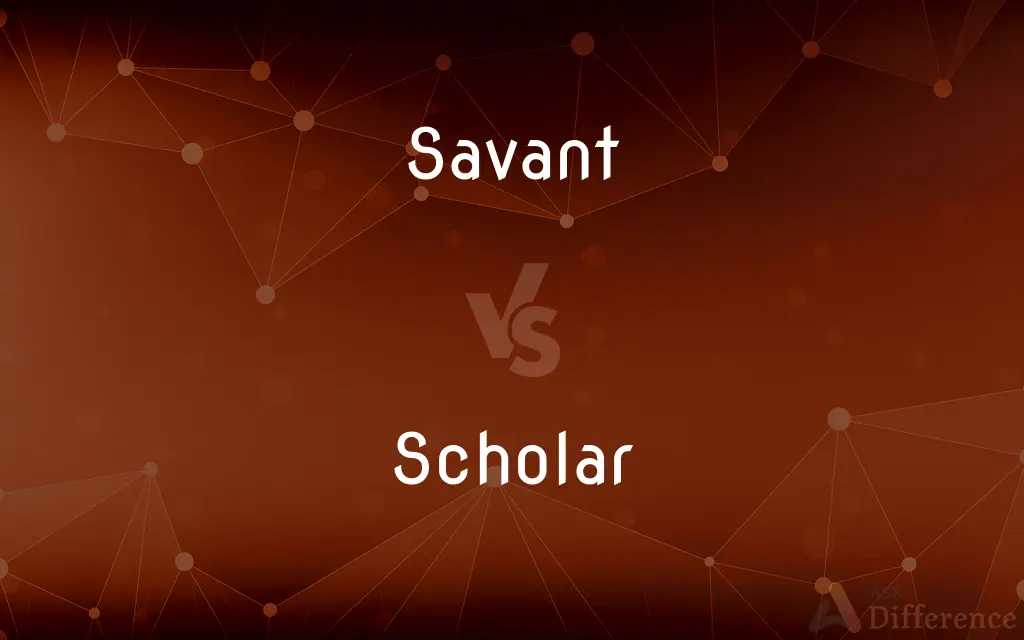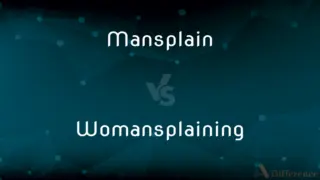Savant vs. Scholar — What's the Difference?
By Tayyaba Rehman & Urooj Arif — Updated on March 29, 2024
A savant possesses extraordinary knowledge or skill in a specific area, often innate, while a scholar engages in extensive study or research in various fields.

Difference Between Savant and Scholar
Table of Contents
ADVERTISEMENT
Key Differences
A savant is someone who exhibits exceptional skill or knowledge in a particular area, often without formal training or education in that field. This expertise can sometimes manifest in individuals with savant syndrome, where such abilities coexist with developmental conditions. On the other hand, a scholar is recognized for their deep, comprehensive knowledge acquired through years of study and research, often contributing new insights or understanding to their field of expertise.
While savants may possess innate abilities or skills in areas such as mathematics, music, or art, showcasing remarkable talents from a young age, scholars achieve their status through deliberate and extensive study. Scholars dedicate significant portions of their lives to education, often holding advanced degrees and producing scholarly work, including articles, books, and lectures.
Savant skills are typically highly specialized and can be extraordinarily developed in one or more areas, sometimes to the point of being considered genius in that specific realm. Conversely, scholars might have a broad range of knowledge across several disciplines or deep expertise in a particular subject, with their achievements rooted in critical thinking, analysis, and academic rigor.
The distinction between a savant and a scholar also lies in the nature of their knowledge and how they come to possess it. Savants often demonstrate an intuitive understanding of complex subjects or perform intricate tasks with little to no formal education in the area, while scholars’ expertise is the result of systematic study and scholarly engagement within academic communities.
The difference between savants and scholars reflects the diverse ways in which exceptional knowledge and skills can be developed and expressed. While savants are often celebrated for their natural talents and extraordinary abilities in specific domains, scholars are esteemed for their intellectual contributions and the depth of their understanding in chosen fields.
ADVERTISEMENT
Comparison Chart
Nature of Knowledge
Innate, often specific to certain domains like math or art
Acquired through extensive study and research
Acquisition
Natural ability, sometimes evident from a young age
Years of education, often formal, and scholarly activities
Specialization
Highly specialized in one or a few areas
Broad or deep expertise in academic or research fields
Recognition
For extraordinary talents in specific areas
For intellectual contributions and scholarly work
Education
Not necessarily formally educated in their area of talent
Typically holds advanced degrees and engages in academia
Compare with Definitions
Savant
An individual whose talents are predominantly self-taught or innate.
As a language savant, she could learn and speak new languages with little effort.
Scholar
Someone who has a deep, comprehensive understanding of a particular field or subject.
The history scholar is known for his insightful analysis of ancient civilizations.
Savant
An individual with exceptional skills in a specific area, often innate.
Despite having no formal music training, the young savant played the piano flawlessly.
Scholar
An individual dedicated to academic excellence and the advancement of knowledge.
The scholar's contributions to medical research have saved countless lives.
Savant
Someone who possesses an extraordinary depth of knowledge or skill in a narrow field.
The chess savant amazed everyone with his strategic prowess.
Scholar
A person engaged in the pursuit of learning and research, often within an academic setting.
The scholar spent decades studying the impacts of climate change.
Savant
A term often associated with savant syndrome, where significant talents coexist with developmental conditions.
His abilities as a mathematical savant were discovered at a very young age.
Scholar
An individual holding advanced degrees and contributing to academic knowledge through writing, teaching, and research.
As a distinguished scholar in linguistics, her work on language acquisition is widely recognized.
Savant
A person who demonstrates remarkable ability in a particular domain, sometimes alongside developmental differences.
The art savant could recreate complex landscapes from memory after a single viewing.
Scholar
A term indicating membership within an academic or scholarly community.
She was awarded a scholarship to continue her work as a scholar in renewable energy.
Savant
A learned person; a scholar.
Scholar
A scholar is a person who pursues academic and intellectual activities, particularly those that develop expertise in an area of study. A scholar may also be an academic, who works as a professor, teacher or researcher at a university or other higher education institution.
Savant
A person with savant syndrome.
Scholar
A learned person.
Savant
A person of learning, especially one who is versed in literature or science.
Scholar
A specialist in a given branch of knowledge
A classical scholar.
Savant
A person who is considered eminent because of their achievements.
Scholar
One who attends school or studies with a teacher; a student.
Savant
A person with significant mental disabilities who is very gifted in one area of activity, such as playing the piano or mental arithmetic.
Idiot savant
Scholar
A student who holds or has held a particular scholarship.
Savant
A man of learning; one versed in literature or science; a person eminent for acquirements.
Scholar
A student; one who studies at school or college, typically having a scholarship.
Savant
Someone who has been admitted to membership in a scholarly field
Scholar
A specialist in a particular branch of knowledge.
Scholar
A learned person; a bookman.
Scholar
(Singapore) someone who received a prestigious scholarship
Scholar
One who attends a school; one who learns of a teacher; one under the tuition of a preceptor; a pupil; a disciple; a learner; a student.
I am no breeching scholar in the schools.
Scholar
One engaged in the pursuits of learning; a learned person; one versed in any branch, or in many branches, of knowledge; a person of high literary or scientific attainments; a savant.
Scholar
A man of books.
Scholar
In English universities, an undergraduate who belongs to the foundation of a college, and receives support in part from its revenues.
Scholar
A learned person (especially in the humanities); someone who by long study has gained mastery in one or more disciplines
Scholar
Someone (especially a child) who learns (as from a teacher) or takes up knowledge or beliefs
Scholar
A student who holds a scholarship
Common Curiosities
Are all savants born with their abilities?
Most savants are born with their extraordinary abilities or develop them at an early age, though some cases involve talents emerging after a brain injury or illness.
How do scholars contribute to their fields?
Scholars contribute through research, teaching, publishing scholarly articles and books, and participating in academic communities.
What distinguishes a savant from a scholar?
A savant possesses innate or extraordinary abilities in a specific area, often without formal training, whereas a scholar acquires deep knowledge through years of study and research.
Can someone with savant syndrome lead a normal life?
Many individuals with savant syndrome can lead fulfilling lives, especially with supportive environments and opportunities to utilize their talents.
Is formal education necessary to be considered a scholar?
Typically, yes; scholars usually have advanced degrees and are active in academic or professional research settings.
Do scholars need to specialize in a single field?
While many scholars specialize, some engage in interdisciplinary studies, integrating knowledge from multiple fields.
Can a savant also be a scholar?
While rare, it’s possible for someone to exhibit savant-like talents and also pursue formal scholarly activities in the same or different fields.
What is the role of a scholar in society?
Scholars play a crucial role in advancing knowledge, educating future generations, and addressing complex societal challenges through research.
Why is collaboration important for scholars?
Collaboration allows scholars to share insights, combine expertise, and undertake comprehensive research projects that advance their fields significantly.
Are savants aware of their extraordinary abilities?
Awareness can vary; some savants are fully aware of their talents, while others may not be cognizant of the extent of their abilities.
Can savant skills be developed later in life?
Most savant skills are present from a young age, but there are rare instances where such abilities emerge following significant neurological changes.
What motivates scholars in their work?
Scholars are often driven by a passion for knowledge, intellectual curiosity, and the desire to contribute to the understanding and betterment of society.
What challenges do savants face?
Savants, especially those with developmental conditions, may face social, communicative, and educational challenges.
How are savant abilities discovered?
Savant abilities are often discovered through exposure to activities related to their skills or accidentally, when an individual demonstrates extraordinary capabilities in a specific area.
How do institutions support scholars?
Institutions support scholars through funding, providing research opportunities, and facilitating academic and professional growth.
Share Your Discovery

Previous Comparison
Enamored vs. Love
Next Comparison
Mansplain vs. WomansplainingAuthor Spotlight
Written by
Tayyaba RehmanTayyaba Rehman is a distinguished writer, currently serving as a primary contributor to askdifference.com. As a researcher in semantics and etymology, Tayyaba's passion for the complexity of languages and their distinctions has found a perfect home on the platform. Tayyaba delves into the intricacies of language, distinguishing between commonly confused words and phrases, thereby providing clarity for readers worldwide.
Co-written by
Urooj ArifUrooj is a skilled content writer at Ask Difference, known for her exceptional ability to simplify complex topics into engaging and informative content. With a passion for research and a flair for clear, concise writing, she consistently delivers articles that resonate with our diverse audience.














































